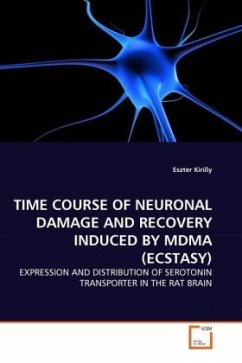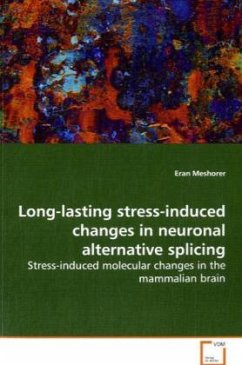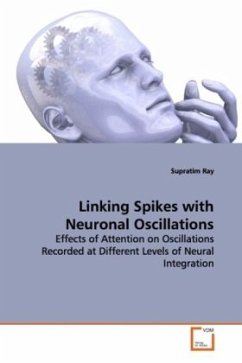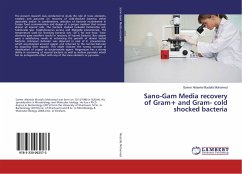
TIME COURSE OF NEURONAL DAMAGE AND RECOVERY INDUCED BY MDMA (ECSTASY)
EXPRESSION AND DISTRIBUTION OF SEROTONIN TRANSPORTER IN THE RAT BRAIN
Versandkostenfrei!
Versandfertig in 6-10 Tagen
39,99 €
inkl. MwSt.

PAYBACK Punkte
20 °P sammeln!
Ecstasy , 3,4-methylenedioxymethamphetamine (MDMA), an amphetamine analogue is one of the most widely used recreational drugs. In spite of the fact that neurotoxic effects of MDMA has been found in several species from rodents to non-human primates, and results increasingly point to damage also in human MDMA users, data about the sensitivity of different brain areas and the recovery after neuronal damage are scarce. These studies were designed to characterize MDMA-induced damage and recovery of the serotonergic system including sleep and morphological changes within 180 days. Our findings conc...
Ecstasy , 3,4-methylenedioxymethamphetamine (MDMA), an amphetamine analogue is one of the most widely used recreational drugs. In spite of the fact that neurotoxic effects of MDMA has been found in several species from rodents to non-human primates, and results increasingly point to damage also in human MDMA users, data about the sensitivity of different brain areas and the recovery after neuronal damage are scarce. These studies were designed to characterize MDMA-induced damage and recovery of the serotonergic system including sleep and morphological changes within 180 days. Our findings concerning the changes detected in 5-HTT mRNA expression and fibre density indicate lasting impairment of the serotonergic system and suggest that a single use of MDMA may be associated with long-lasting cognitive, learning, memory and mood deficits and sleep disturbances particularly when a constellation of genetic vulnerability and certain environmental factors are present. Our data provide further evidence for the connection between altered serotonergic functions and sleep disturbance.












